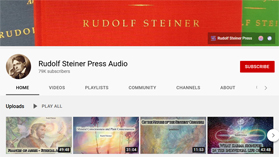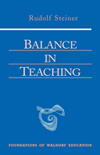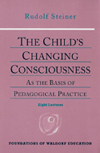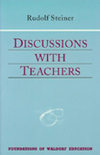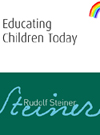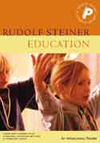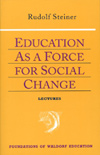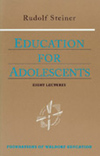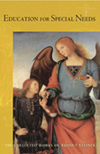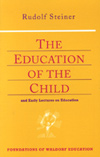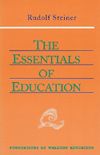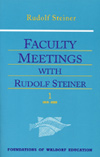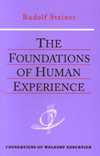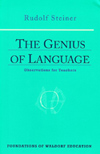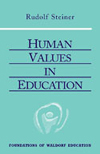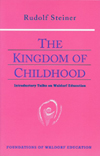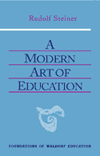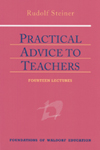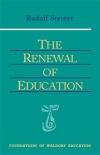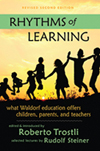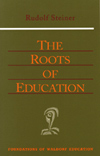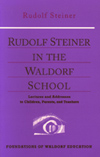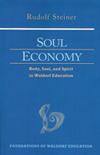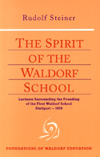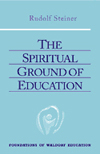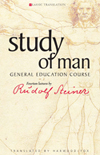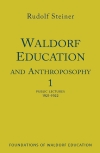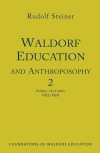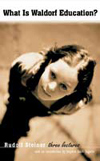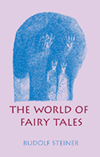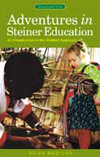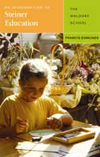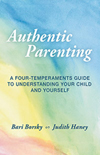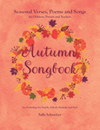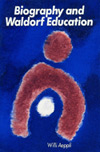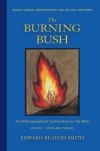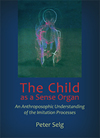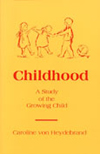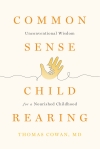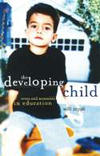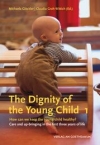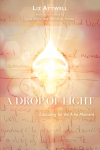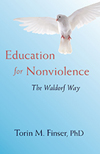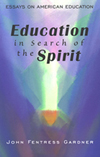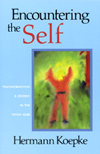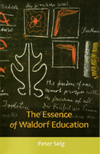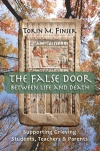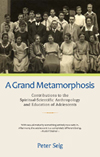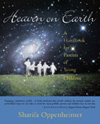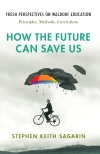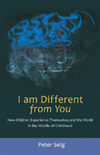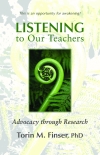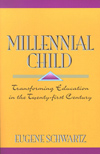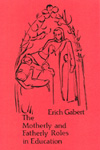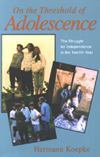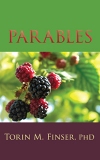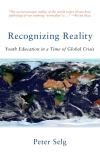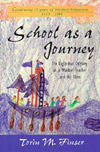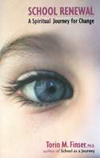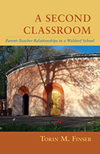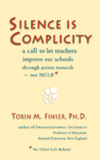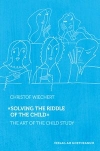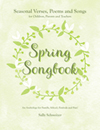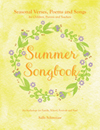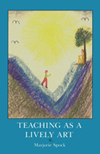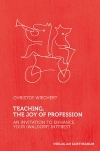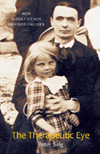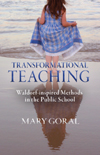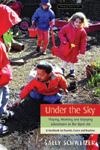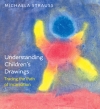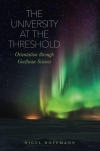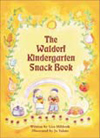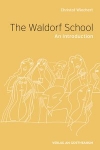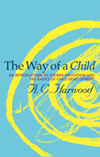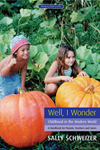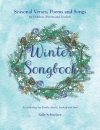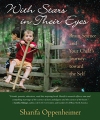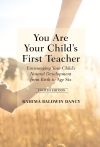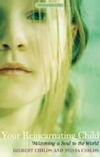
- RUDOLF STEINER
- OTHER AUTHORS
-
EDUCATION AND CHILD DEVELOPMENTRUDOLF STEINER
Speaking to the teachers at the first Waldorf School in Stuttgart, Steiner asserts that the unfortunate presence of dishonesty and alienation in society today cannot be addressed without a completely renewed and holistic education. He states fact that successful teaching requires a living synthesis of the "spiritual gymnast", the "ensouled rhetorician" and the "intellectual professor". Of these, the formative effect of the rhetorician's cultivation of artistic speech is the most important.
THE CHILD'S CHANGING CONSCIOUSNESS
As the Basis of Pedagogical Practice
These lectures are ideal for anyone first approaching Waldorf education. Using language that any teacher or parent can understand, Steiner goes into the essentials of his educational philosophy, providing many examples and anecdotes to convey his meaning. Against the background of the developing child, he allows the curriculum and the method of teaching to emerge as the commonsense conclusion of practical experience.
'Foundations of Waldorf Education' series
Steiner does not prescribe specific methods but introduces topics and situations, giving guidelines and allocating practical assignments that are taken up and discussed in the next session. In this way, the discussions are filled with insights and indications in many different areas of teaching - history, geography, botany, zoology, form drawing and mathematics. These fifteen discussions constitute an essential part of the basic training material for Waldorf teachers.
"Vague and general phrases... cannot provide the basis for a genuine art of education, which depends on real knowledge of the human being. It is not that such phrases are wrong, but that they are as useless as saying that all parts of a machine must be made to work together harmoniously. To make a machine work you have to apply real, detailed knowledge, not phrases and truisms. For the art of education likewise, what is important is specific insight into the way the human being is constituted, and how each aspect develops."
An Introductory Reader
Compiled with an introduction, commentary and notes by Christopher Clouder
A social basis for education; The spirit of the Waldorf school; Educational methods based on anthroposophy; The child at play; Teaching from a foundation of spiritual insight and education in the light of spiritual science; The adolescent after the fourteenth year; Science, art, religion and morality; The spiritual grounds of education; The role of caring in education; The roots of education and the kingdom of childhood; Address at a parents' evening; Education in the wider social context.
EDUCATION AS A FORCE FOR SOCIAL CHANGE
Rudolf Steiner discusses themes relating to education and social life.
'Foundations of Waldorf Education' series
In these eight talks on education for adolescent-aged young people, Steiner addressed the teachers of the first Waldorf school two years after it was first opened. An upper school was needed, and Steiner wanted to provide a foundation for study and a guide for teachers already familiar with his approach to the human being, child development, and education based on spiritual science.
The Curative Education Course
‘Essentially we do not really have the right to talk about normality or abnormality in a child’s inner life, nor indeed in the inner life of human beings altogether... One does not gain much from such labelling, and the first thing to happen should be that the physician or the teacher rejects such an assessment, and goes further than saying that something is clever or sensible according to the way people are habitually thinking.’ – Rudolf Steiner
and Early Lectures on Education
A fundamental collection of Steiner's early writings and lectures on Waldorf education including his essential essay, "Education of the Child in the Light of Spiritual Science".
'Foundations of Waldorf Education' series
Paperback
Torin M. Finser (from the introduction): “Some months before giving the lectures contained in this volume, Steiner spoke in England on the theme of karmic relationships. In fact, The Essentials of Education is embedded in his concurrent work on karmic relationships in that the educational lectures were given from April 8 to 11, “bookended” by a karmic lecture on the sixth and twelfth of April in Dornach, Switzerland. Themes, such as human relationships, biography and temperaments, the influences of Sun and Moon, the need to see beyond the sense-perceptible, and much more were developed in great detail in the karmic lectures, and they are echoed in the lectures on education in Stuttgart and Bern.
FACULTY MEETINGS WITH RUDOLF STEINER
Volumes 1 & 2
'Foundations of Waldorf Education' series
The Waldorf School movement has its roots in the chaotic period following the First World War. Struggling to create the first school, Rudolf Steiner worked on every detail. Lesson plans, religious education, school hours, course resources, administration, finance, child study; no aspect of school life was beyond his attention.
THE FOUNDATIONS OF HUMAN EXPERIENCE
Formerly entitled The Study of Man, this lecture course, newly translated for this series, contains some of the most remarkable and significant lectures ever given by Rudolf Steiner. They include his most concise and detailed account of the nature of the human being, and are therefore absolutely central to anyone seeking to understand anthroposophy and the anthroposophical view of the world.
Observations for Teachers
Rudolf Steiner demonstrates how history and psychology combine to form different languages and how the inmost kernel of language can be accessed today.
The underlying thesis of these lectures, volume 20 in the "Foundations of Waldorf Education" series, is that true education must be based on knowledge of the whole human being and that such knowledge cannot be attained without love. On this basis, Steiner presents his understanding of every aspect of child development - bodily, psychological, and spiritual. At the same time, he shows that, to prove worthy of their calling, teachers must begin a process of inner development. In Steiner's view, it is human beings who give value and meaning to the world. Modern education, however, is gradually undermining this meaning. These lectures demonstrate that education can heal that lack of meaning and restore the meaning of humankind for the world.
'Foundations of Waldorf Education' series
Perhaps because they were given to pioneers dedicated to opening a new Waldorf school, these talks have been considered one of the best introductions to Waldorf education. Steiner shows how essential it is for teachers to work first upon themselves to transfrom their inherent gifts, and to use humour to keep their teaching lively and imaginative. Above all, he stresses the tremendous importance of doing everything with the knowledge that the child is a citizen of both the spiritual and earthly worlds. Throughout, he returns to the practical value of Waldorf education.
'Foundations of Waldorf Education' series
These lectures comprise one of the most comprehensive introductions to Rudolf Steiner's philosophy, psychology, and practice of education.
How do Waldorf teachers put their educational ideals into practice in the classroom? How does a teacher connect geography and art and language in a way that enlivens the souls of children? What does a child's respect for the teacher mean for later life? These are only a few practical aspects of this initial course for Waldorf teachers.
14 lectures, Basel, April 20-May 16, 1920 (CW 301)
(Revised second edition) Introduction by Roberto Trostli
What Waldorf Education Offers Children, Parents, and Teachers
“The primary task of a Waldorf teacher is to understand the human being in body, soul, and spirit. The approach, the curriculum, and the methods of an education that can address the whole child will grow from this understanding.” —Roberto Trostli
'Foundations of Waldorf Education' series
The Essentials of Education, together with its companion The Roots of Education (given three days later), present a remarkable synthesis of Waldorf education for teachers, parents, and anyone interested in education. The Waldorf experiment had matured over the five years since its founding into an established, concrete reality. Rudolf Steiner had guided the school from its beginning, observing very closely all that had happened. Thus, in these lectures, he was able to distil and present the essentials of Waldorf education with elegance and urgency.
RUDOLF STEINER IN THE WALDORF SCHOOL
Lectures and Addresses to Children, Parents, and Teachers
Readers will find here a unique glimpse of what Steiner was really like, and how he viewed the school and the educational philosophy he brought into being.
SOUL ECONOMY AND WALDORF EDUCATION
These lectures constitute one of the most important educational cycles, with separate lectures on the following phases of child development: before the 7th year, 7-10, the 10th year, 10-14, and adolescents after 14.
THE SPIRIT OF THE WALDORF SCHOOL
These lectures surrounding the opening of the first Waldorf School provide an excellent, inspiring introduction to the Waldorf spirit and method.
THE SPIRITUAL GROUND OF EDUCATION
'Foundations of Waldorf Education' series
Given during a conference on spiritual values in education and attended by many prominent people of the time, Steiner's Oxford lectures gave him a rare opportunity to present the principles of Waldorf education at the highest cultural level.
General Education Course
Although these lectures were given to teachers as preparatory material, they are by no means concerned only with education. Study of Man is Steiner's most succinct presentation of his human-centred spiritual psychology, accessible to anyone interested in the riddles of human existence. His approach is unique in that it takes account not only of influences working into humanity from the past, but also of future states of consciousness and being.
WALDORF EDUCATION AND ANTHROPOSOPHY 1
Public Lectures 1921-1922
9 lectures, various cities, February 23, 1921-September 16, 1922 (CW 304)
WALDORF EDUCATION AND ANTHROPOSOPHY 2
Public Lectures 1921-1922
12 lectures, various cities, November 19, 1922-August 30, 1924 (CW 304a)
Three Lectures
With an Introduction by Stephen Keith Sagarin
This is a reader-friendly Waldorf "taster," with three public lectures by Rudolf Steiner on Waldorf education and a thought provoking, accessible introduction by a Waldorf teacher and longtime student of Steiner's pedagogy. These lectures by Steiner present what he sees as the "fundamentals" in a matter-of-fact, objective, non-dogmatic way. The introduction, wide-ranging and informative, treats Waldorf education and methodology in general, explaining that, before all else, a Waldorf School is a good school. This is a must-read for anyone involved with, connected to or interested in Waldorf education.
“Fairy tales and sagas are comparable to a good angel, granted human beings as a companion from birth on their life’s wanderings, to be a trustworthy comrade throughout—offering comradeship, and making life inwardly into a truly ensouled fairy tale!” - Rudolf Steiner (quoting Karl Julius Schröer)
-
EDUCATION AND CHILD DEVELOPMENTOTHER AUTHORS
ADVENTURES IN STEINER EDUCATION
An Introduction to the Waldorf Approach
Brien Masters
An internationally acknowledged authority in Steiner education, Brien Masters has worked for decades as teacher (both State and Waldorf), teacher trainer, consultant, writer and lecturer. In Adventures in Steiner Education he draws on his rich and varied experience to paint a vivid picture of Waldorf education in practice. Spicing the text with many personal stories and anecdotes, he brings to life the theory behind this increasingly popular educational approach, from the Early Years through to the Lower and Upper Schools. This lively book serves not only as an informative and entertaining introduction, but also as a helpful refresher course for those seeking to become fully acquainted with the basic principles of Steiner Education.
AN INTRODUCTION TO STEINER EDUCATION
The Waldorf School
Francis Edmunds
'To educate youth ... is to ennoble the mind, to fire the imagination, to fortify the will and to quicken initiative for life.' So writes Francis Edmunds in this inspiring, authoritative and popular introduction to Steiner (Waldorf) Education.
A Four-Temperaments Guide to Your Child and Yourself
Bari Borsky
Judith Haney
Are you finding it difficult to understand your child? Do you feel frustrated because you often end up in an argument but not sure about how you got there? Authentic Parenting can help.
Seasonal Verses, Poems and Songs for Children, Parents and Teachers
An Anthology for Family, School, Festivals and Fun!
Sally Schweizer
This treasure trove of an anthology is full to the brim with songs and seasonal verses that will delight children and encourage them to sing and play. Illustrated throughout with colour images, the Autumn Songbook features five thematic sections: ‘Animals and Birds’, ‘Farming-Harvest’, ‘Festivals & Related Themes’, ‘Weather’, and ‘Spooks, Riddles & Odd Things’. Providing ample material for teachers and parents, the book also includes selections of rhyming words, commentary on the significance of repetition, rhythm and beat, suggestions for incorporating movement and gesture, and practical teaching and parenting tips.
BIOGRAPHY AND WALDORF EDUCATION
Willi Aeppli
Rudolf Steiner, Anthroposophy, and the Holy Scriptures: Terms & Phrases
3rd revised edition
Edward Reaugh Smith
More significant for Christianity than the twentieth-century Dead Sea and Nag Hammadi discoveries is the growing North American awareness of Rudolf Steiner's works. No Bible commentary has yet reflected the remarkable spiritual insights of Anthroposophy. In The Burning Bush, Edward Reaugh Smith combines his own extensive traditional biblical knowledge with his years of concentrated study and reflection on hundreds of assembled works by Steiner. The result is the first Bible commentary in the light of anthroposophic insight.This volume is based on the anthroposophic understanding given to humanity by Rudolf Steiner during the first twenty-five years of the twentieth century. The dramatic newness of anthroposophic thought means that the usual method of Bible commentary is not appropriate here. Much of The Burning Bush is devoted to laying an anthroposophic, or spiritual-scientific, groundwork. A major assumption indulged in most Bible commentaries—that one can go directly to portions dealing with given passages of scripture and understand what is being said about them—does not fit.
An Anthroposphic Understanding of the Imitation Processes
Peter Selg
“Because children’s ability to observe and perceive is unconscious, one does not notice how intensely and deeply the impressions coming from the surroundings enter their organization—not so much by way of various specific senses as through the general ‘sensory being’ of the child. It is generally known that the formation of the brain and of the nerves is completed by the change of teeth. During the first seven years, children’s nerve-and-sense organization, in its plasticity, could be likened to soft wax. During this time, not only do children receive the finest and most intimate impressions from the surroundings, but also, through the working of energy in the nerve-and-sense system, everything received unconsciously radiates and flows into the blood circulation, into the firmness and reliability of the breathing process, into the growth of the tissues, and into the formation of the muscles and skeleton. By means of the nerve-and-sense system, the body of children becomes like an imprint of the surroundings and, particularly, of the morality inherent in them.” —Rudolf Steiner
(Waldorf Education and Anthroposophy 2, p. 68)A Study of the Growing Child
Caroline von Heydebrand
Caroline von Heydebrand, a teacher in the first Waldorf school, traces human development through childhood. She describes the spirit and soul as the child incarnates and how the individual comes to expression in various ways, including the particular temperament; the unique formative forces that give shape to the physical body; the development of consciousness; natural transitions in the child's life; and the child's destiny and relationship to the world.
Unconventional Wisdom for a Nourished Childhood
Thomas Cowan, MD
Can we raise healthy children in a toxic world? Yes, we can!
Sense and Nonsense in Education
Willi Aeppli
This experienced Waldorf teacher allows us to enter his classroom and gain insights that serve as valuable guides for both parents and educators. Aeppli also presents a challenge to teachers: penetrate the subject, grasp its essence, transform it artistically, and present it to the children in a way that fits their evolving inner orientation. This fresh approach is not just another theory about good education. Aeppli writes out of practical experience with the intention of sending young adults into the world who can stand on their own two feet and accept responsibility for their own actions.
THE DIGNITY OF THE YOUNG CHILD, VOL. 1
How can we keep the young child healthy?
Care and up-bringing in the first three years of life
Michaela Glöckler
Claudia Grah-Wittich
New and successful insights for the care and raising of the child in the first three years of life.
Educating for the A-ha Moment
Liz Attwell
with contributions by Josie Alwyn and Catherine Fenton
A-ha!
The Waldorf Way
Torin M. Finser PhD
Education for Nonviolence describes how we can actually do something about our increasingly violent world. Few in the media draw a clear connection between the all-too-frequent tragedies we hear and read about in the news each day and the way as parents and teachers we raise and educate our children. Abstract concepts, rote learning, and standardized tests cannot develop the emotional and social intelligence our children need later in life to build relationships, contribute to society, and succeed in the workplace. The author describes how Waldorf independent and charter schools provide much-needed pathways toward wholeness—sensory and nature-based education; the arts; character education; community building; traditions of hospitality; meeting the needs of boys...to name just a few of the topics covered in this book.
EDUCATION IN SEARCH OF THE SPIRIT
Essays on American Education
John Fentress Gardner
Real education will always seek to strengthen what is best in the human soul: its longing for the experience of spiritual truth that brings into the self an objective appreciation of the noble aspects of its own nature, together with a subjective sense of real affinity with the rest of humanity, the earth planet as a whole, and the great cosmos above and beyond.
Transformation and Destiny in the Ninth Year
Hermann Koepke
A lucid explanation of events in the life of a child between the ninth and tenth year, a time when the ego incarnates more deeply.
THE ESSENCE OF WALDORF EDUCATION
Peter Selg
"It is a simple but essential principle: education aims at the future, at a time that we as educators do not yet know and cannot foresee. The challenges that will confront the children in the future are not those of the past - of our past, of our life story and our horizon. Times change, so do the realities of life, and in our times they change quickly and dramatically. Education aims at the future and that puts us as educators in a difficult situation: this future is not - or is only to an extent - identical with our past, with our life experiences. My youth, your youth: they are not identical with the adolescent constitution and life reality toward which we currently have to direct our educational efforts. Yet educate we must, and educating means preparing for a future." - Peter Selg (from the book)
THE FALSE DOOR BETWEEN LIFE AND DEATH
Supporting Grieving Students, Teachers, and Parents
Torin M. Finser
When a school community loses a child, parent, or teacher, the experience can be devastating to the whole community. Few things in life can prepare anyone for such a tragedy. Teachers and parents often struggle with how to speak with the children and may have important questions, such as:
What is the best way to work with grief?
What happens after death?
How can we stay connected?
Working through shock, grief, and even depression is a necessary step in life following a death in one’s community.Contributions to the Spiritual-Scientific Anthropology and Education of Adolescents
Peter Selg
"A tumultuous situation arises in the relationship between the adolescent...and the world. This tumultuous situation is necessary, and as teachers, we need to have it in mind during the years leading up to it. Overly sensitive teachers might get the idea that it would be better to spare young people this upheaval. However, in so doing, they would make themselves the worst enemy of youth." - Rudolf Steiner.
A Handbook for Parents of Young Children
Sharon Oppenheimer
Photography by Stephanie Gross
As we witness the shifting of old forms that once stood as the foundation of our daily lives, parents - who must prepare the next generation to meet this changing world - have more questions now than ever before. Although our culture and the nature of the family may be changing, the atmosphere in the home continues to create the foundation of a child's life. In Heaven on Earth, parent and educator Sharifa Oppenheimer reveals how to make the home environment warm, lively, loving, and consistent with your highest ideals.
Fresh Perspectives on Waldorf Education: Principles, Methods, Curriculum
Stephen Keith Sagarin, PhD
“Education prepares us for an unknown, uncertain future. Conformity, convention, and a lack of creative thinking and action will not serve us fully to face this future. We cannot know, and can only guess, what the future will bring, and we educate truly when we educate for inspiration—for insight and creativity—in the face of the unknown. We aim not to define our students, not to pigeonhole them according to our own inevitably partial and too-narrow view of the world they will inhabit and make. We aim to educate them while leaving them free to rebel, not for no reason, but for a reason, for a cause.” —StephenSagarin (from the introduction)
How Children Experience Themselves and the World in the Middle of Childhood
Peter Selg
In many of his lectures to teachers on education, Rudolf Steiner called attention to a significant but often overlooked change in the way children experience themselves and the world that occurs in the middle of childhood, in the ninth or tenth year. "There comes a time when children show, not in what they say but in their whole behaviour, that they are struggling with a question or a number of questions that indicates a crisis in their soul life. It is a very subtle experience for the child that requires an equally subtle response."
Advocacy through Research
Torin M. Finser
This book (first published as Silence Is Complicity) began life at an Antioch University Waldorf program for educators to introduce students to action research, a philosophy and methodology for transformative change through the process of taking action and doing research. This revised and expanded edition focuses on research and the inner life, indigenous research methods, and much more—all to empower teachers and support their enthusiasm for learning and developing new curricula. Teacher research goes beyond personal understanding to a level of documented inquiry that holds up to public scrutiny while also challenging misguided funding, tests, and legislation.
Transforming Education in the Twenty-First Century
Eugene Schwartz
Today’s children are like an endangered species. Many have lost their childhood and have been prematurely thrust into the confusing and chaotic world of the adults. Schwartz points to the radically new paradigm of childhood development offered by Waldorf education. Parents, teachers and child psychologists will find here a wealth of insight concerning educational questions.
THE MOTHERLY AND FATHERLY ROLES IN EDUCATION
Erich Gabert
ON THE THRESHOLD OF ADOLESCENCE
The Struggle for Independence in the Twelfth Year
Hermann Koepke
This book tells the story of how Suzanne, a young Waldorf teacher, struggles with the changes her class is going through. The problems she and parents must deal with are familiar to all parents - drug use, smoking, lack of responsiveness, rebelliousness, and moodiness.
Torin M. Finser
“One could say that a parable contains a larger lesson in a bite-sized portion. Using other words, a parable is a simple short story used to illustrate a moral or spiritual lesson.... The word parable can be traced back to Middle English and Old French origins as parabole and to the ecclesiastical Latin sense of parabola, meaning “discourse, allegory, or comparison.”... Parables use comparison, allegory, imagery, analogy, or a short story to convey a larger meaning.” (from the book)
Youth Education in a Time of Global Crisis
Peter Selg
“[Children and young people] should know—and really sense and feel—that viruses are not ‘evil’ but a part of our organism, of our organic ‘self,’ and that also the group of mutable coronaviruses has been known for many years; we also live with them and deal with them, especially in the upper respiratory tract, although not with SARS-CoV-2, which is a new challenge for the human immune system, though not quite as new as initially assumed.” — Peter Selg
The Eight-Year Odyssey of a Waldorf Teacher and His Class
Torin M. Finser
A lively, colourful, absorbing account of one Waldorf teacher's journey with his class through the curriculum from first through eighth grades. A moving story, told in a straightforward, anecdotal, humorous style, it is an excellent introduction to what goes on inside the classroom of a Waldorf school.
A Spiritual Journey for Change
Torin M. Finser
In today's educational crisis, many people are coming to realize that there is far more to a school than imparting knowledge and skills and administering tests. Schools are communities, and like all communities, they can be healthy or unhealthy. School Renewal speaks to the problems and challenges of developing healthy schools. Using mythology, personal experience, and his research, Torin Finser describes how teachers and parents can handle such common problems as burnout, organizational stress, interpersonal conflict, and change.
Parent-Teacher Relationships in a Waldorf School
Torin M. Finser
What does a healthy, successful school look like? Is it all about measurable outcomes, test scores, and pass/fail grades set by the government? Can learning be quantified in short-term measurements or does real learning take years to manifest in a career or biography. All seem to agree that a healthy school is also a community and that community depends on the quality of relationships—chiefly the relationships among students, teachers, and parents.
A Call to Let Teachers Improve Our Schools through Action Research - Not NCLB (No Child Left Behind)
Torin M. Finser, Ph.D.
What if the voices of our teachers were truly heard in today's public discourse? Teachers work with children everyday and have always understood intuitively the materials and curriculum needed. Teacher research, however, allows teachers to go beyond intuitive understanding to a level of documented inquiry that can stand the light public scrutiny in publications, news media, workshops, and town meetings.
SOLVING THE RIDDLE OF THE CHILD
The Art of Child Study
Christof Wiechert
It may be a truism to say that every teacher should make efforts to understand his pupils. Our real understanding, after all, can be a sure foundation and support for children’s whole development; and without this our lessons will be a random undertaking that connects with our pupils, at best, only in a superficial way. A skilled teacher seeks to understand his pupils so that he can raise learning beyond mere compulsion or drill. It was Rudolf Steiner’s ideal that the weekly pedagogical meetings in Waldorf schools should support teachers’ continually developing insight into their pupils. He exhorted them to ‘become psychologists’ but did not mean this in the commonly understood sense. He himself demonstrated this ‘art of evolving insight’ in the faculty meetings in which he participated on many occasions. One can say that it is an essential part of the quality of our work as teachers for us to develop these skills of perception, reflection and insight. Christof Wiechert here picks up these suggestions of Steiner’s anew. He elaborates from them the art of the child study as a key tool in nurturing pupils’ development and, at the same time, teachers’ own growing powers of insight. In short, the approach described here can enliven the educational and social dimensions of a whole school community.
Seasonal Verses, Poems and Songs for Children, Parents and Teachers
An Anthology for Family, School, Festivals and Fun!
Sally Schweizer
This treasure trove of an anthology is full to the brim with songs and seasonal verses that will delight children and encourage them to sing and play. Illustrated throughout with colour images, the Spring Songbook features four thematic sections: ‘Animals and Birds’, ‘Nature’, ‘Dancing and Games’ and ‘International Greetings and Foreign Languages’. Providing ample material for teachers and parents, the book also includes selections of rhyming words, commentary on the significance of repetition, rhythm and beat, suggestions for incorporating movement and gesture, and practical teaching and parenting tips.
Seasonal Verses, Poems and Songs for Children, Parents and Teachers
An Anthology for Family, School, Festivals and Fun!
Sally Schweizer
This treasure trove of an anthology is full to the brim with songs and seasonal verses that will delight children and encourage them to sing and play. Illustrated throughout with colour images, the Summer Songbook features four thematic sections: ‘Animals and Birds’, ‘Nature’, ‘Dancing, Rounds and Games’ and ‘Silly Verses’. Providing ample material for teachers and parents, the book also includes selections of rhyming words, commentary on the significance of repetition, rhythm and beat, suggestions for incorporating movement and gesture, and practical teaching and parenting tips.
Marjorie Spock
The author, an experienced Waldorf teacher and eurythmist, radiates her enthusiasm and sense for beauty as she takes us through the various stages of development of the child. She shows us that nothing can be taught to the child until he or she is ready to receive it. This book will help us approach the child with sensitivity and insight.
TEACHING, THE JOY OF PROFESSION
An Invitation to Enhance Your (Waldorf) Interest
Christof Wiechert
To be a teacher and teaching children and youngsters is still a wonderful profession: it never gets dull or boring. But it is also a professional life under pressure. Complex demands, a high profile in professionalism, delivering sound results, yet also being attentive to the individual needs and development of the students and helping parents to understand their own child. All this demands from the teacher a multitasking talent. The teacher is constantly serving others, without time for him or herself. Working in this profession you can easily lose your balance – the balance between inner needs and demands put on you by children, their performances, the parents and the school organism as a whole. If that happens, then we grow sour in this delightful profession. This book is a guide to find that balance which means gaining access to more energy.
How Rudolf Steiner Observed Children
Peter Selg
Rudolf Steiner's extraordinary ability to perceive the inner nature and development of children provided insights at many levels and areas of the creative learning process. He spoke of this ability as a precondition for all forms of healthy childhood education - including special education - and suggested that teachers should develop such a capacity within themselves.
Waldorf-Inspired Methods in the Public School
Mary Goral
Mary Goral explores ways that Waldorf principles can be applied in public schools to educate children for life rather than simply to meet the demands of rigid, one-size-fits-all programmes. She points out ways that Waldorf methods require teachers and parents to engage more fully with students, to practice ways of self-development, and to build a greater sense of community. Using the concrete example of the 'Waldorf-inspired Cadre' - a group of state-school teachers 'who have agreed to go on such a journey, take risks, and learn new skills along with their students' - Dr Goral shows how teachers can bring many of the benefits of Waldorf education into the public setting, with remarkable results.
Playing, Working and Enjoying Adventures in the Open Air
A Handbook for Parents, Carers and Teachers
Sally Schweizer
'An uplifting philosophy on childhood and life, and an absolute treasure trove of information for anyone who believes nature and childhood are perfect companions. Sally Schweizer manages to combine magic with common sense in this wonderful book, which is authentic from cover to cover. What she writes with such lively enthusiasm, she has also lived.' - Sally Jenkinson, author of The Genius of Play
UNDERSTANDING CHILDREN’S DRAWINGS
Tracing the Path of Incarnation
Michaela Strauss
It is not uncommon for children’s drawings to end up in the wastepaper basket. Yet these early artistic expressions indicate how children communicate with their environment. From the first scratches and scribbles to the detailed sketches of houses and people, the drawings and paintings of our young ones are significant manifestations of inner processes, containing important statements about their development and gradual incarnation into a physical body.
THE UNIVERSITY AT THE THRESHOLD
Orientation through Goethean Science
Nigel Hoffmann
‘Concern for the world today provides the impetus to ask of ourselves a profound question… how can our way of knowing, the very style of our thinking which informs our research and our teaching, come to express care, to reveal itself to be a deed and duty of care?’
WALDORF KINDERGARTEN SNACK BOOK
Lisa Hildreth
Illustrated by Jo Valens
Here is a useful compendium of information, recipes, and anecdotes from Waldorf kindergarten teacher Lisa Hildreth - a rich book for teachers, parents, and anyone who cares for young children.
An Introduction
Christof Wiechert
What is distinctive about Waldorf or Rudolf Steiner schools? How do their pedagogical aims relate to the wide range of educational provision available today? Many people have heard of these schools, but few know much about them.
An Introduction to Steiner Education and the Basics of Child Development
A.C. Harwood
Pressured by exams and premature academic demands, surrounded by screens and technology, children today face huge challenges. Childhood itself, it could be said, is facing a crisis. Are children in danger of losing their natural imaginative faculties, which are the source of all creative activity in later life? As a society, are we in danger of losing childhood altogether?
Childhood in the Modern World
A Handbook for Parents, Teachers and Carers
Sally Schweizer
'Have we come to misunderstand children? Have we forgotten that children's consciousness, their minds, are intrinsically different from ours? And is that why we are trying to train them to become 'adult', rather than realizing we need to relearn our way of thinking in order to understand children?'
Seasonal Verses, Poems and Songs for Children, Parents and Teachers
An Anthology for Family, School, Festivals and Fun!
Sally Schweizer
This treasure trove of an anthology is full to the brim with songs and seasonal verses that will delight children and encourage them to sing and play. Illustrated throughout with colour images, the Winter Songbook features four thematic sections: ‘Christmas’, ‘Winter Indoors’, ‘Wintry Weather’ and ‘Winter Outdoors’. Providing ample material for teachers and parents, the book also includes selections of rhyming words, commentary on the significance of repetition, rhythm and beat, suggestions for seasonal stories, and practical teaching and parenting tips.
Brain Science and Your Child’s Journey toward the Self
Sharifa Oppenheimer
In this book readers will find not only a heart-filled rendering of the gentle ways young children have been traditionally raised and educated, but also cutting-edge research that supports these practices. With love as the foundation, and through the neural tapestry created by joyful movement, music, art, stories, and play, we feed and bathe the brain of the young child. These deep connections with life are woven together during childhood to become the wholeness we call “I”.
YOU ARE YOUR CHILD'S FIRST TEACHER
Encouraging Your Child’s Natural Development from Birth to Age Six
Fourth Edition
Rahima Baldwin Dancy
“I feel strongly that we don’t need another authority or set of rules by which to raise children, and I remind parents that Steiner himself never had any children. But if we can enlarge our understanding of child and adult development to encompass the whole human being—body, mind, emotions, and spirit—then we will be better equipped to make our own decisions based on a combination of cognitive and intuitive knowledge.” (preface)
Welcoming a Soul to the World
Dr Gilbert Childs and Sylvia Childs
The primary contention of this book is that, as a spiritual being, each of us lives beyond death, and eventually returns to earth in a new human body. With this knowledge in mind, the authors give much sound practical advice as to how parents, and others who spend time with children, can welcome a soul to the world and help it grow into a healthy and responsible human being.

